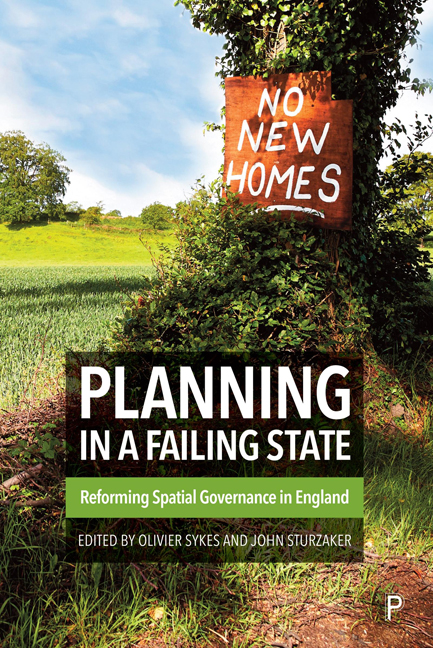Book contents
- Frontmatter
- Dedication
- Contents
- List of figures and tables
- Notes on contributors
- Acknowledgements
- 1 Introduction
- 2 The (housing) numbers game
- 3 Localism: the peccadillos of a panacea
- 4 Planning at the ‘larger than local’ scale: where next?
- 5 PD games: death comes to planning
- 6 Building beauty? Place and housing quality in the planning agenda
- 7 Zoning in or zoning out? Lessons from Europe
- 8 Planning and the environment in England, 2010–22: cutting ‘green crap’, Brexit and environmental crises
- 9 Stuck on infrastructure? Planning for the transformative effects of transport infrastructure
- 10 Conclusion
- Index
8 - Planning and the environment in England, 2010–22: cutting ‘green crap’, Brexit and environmental crises
Published online by Cambridge University Press: 27 March 2024
- Frontmatter
- Dedication
- Contents
- List of figures and tables
- Notes on contributors
- Acknowledgements
- 1 Introduction
- 2 The (housing) numbers game
- 3 Localism: the peccadillos of a panacea
- 4 Planning at the ‘larger than local’ scale: where next?
- 5 PD games: death comes to planning
- 6 Building beauty? Place and housing quality in the planning agenda
- 7 Zoning in or zoning out? Lessons from Europe
- 8 Planning and the environment in England, 2010–22: cutting ‘green crap’, Brexit and environmental crises
- 9 Stuck on infrastructure? Planning for the transformative effects of transport infrastructure
- 10 Conclusion
- Index
Summary
Introduction
As a substantive field, the environment casts an important but distinctive light on the notion of ‘planning failure’ and its relationship with wider ‘state failure’. For a start, one must acknowledge that countries throughout the world have underachieved when it comes to adequately addressing major environmental problems. Analysts in many states, the UK included, have observed a tendency for national state environmental institutions to lose power and capacity since the late 1990s, leading this period to be labelled as ‘one of stagnation and decline in the environmental nation state’ (Mol, 2016: 52). Momentum was also knocked by the 2008 financial crash. Performance deficits have been particularly acute for cross-national environmental problems like climate change and biodiversity loss that have complex causes in patterns of production, consumption and mobility. The question that arises, then, is whether planning systems have evolved in ways that serve to ameliorate deficiencies in national environmental governance systems or exhibit tendencies that reflect and exacerbate wider failings.
Certainly, the evolution of planning in the UK can be seen as leading and then broadening the front of state environmental governance. From its birth in public health concerns in the 19th-century city, the planning system has provided mechanisms for enabling environmental factors to be considered in decisions about land use, development and infrastructure, and for protecting valued landscapes, buildings and wildlife habitats from damaging development. Since the 1980s, the environmental role of planning has expanded to embrace wider, more systemic issues, including pollution, air and water quality, biodiversity loss, and climate change. Beliefs about how planning might achieve positive environmental outcomes have extended from relatively straightforward protective actions to orchestrating urban forms that might better support multiple environmental and social goals, and reduce demands for car-based travel and energy, water and other resources. Indeed, planning was one of the first policy subsystems to be charged with delivering sustainable development (Owens and Cowell, 2011).
Broadening remits, however, tell us relatively little about environmental performance. Adding ever-more issues to the ‘to-do’ list of planning may overburden the system with expectations and perhaps even exemplify ‘local scalar dumping’, that is, passing responsibilities to local agencies with limited powers and resources in lieu of more effective national action. Moreover, planning has never just been about environmental ‘delivery’; rather, it involves the balancing of multiple economic, social and environmental objectives.
- Type
- Chapter
- Information
- Planning in a Failing StateReforming Spatial Governance in England, pp. 120 - 137Publisher: Bristol University PressPrint publication year: 2023



